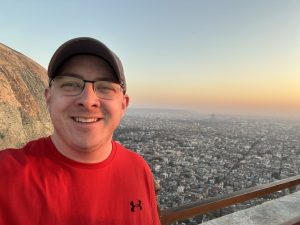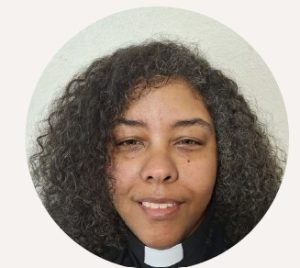A little over a year ago I was approached by two of our ELCA seminaries with an invitation to teach a May term class on disability theology and ministry. After a few (okay, several) moments of thinking “Who…me?” and many calls with some of my trusted friends/colleagues and family, I answered with a cautious “Sure! When?”. May term 2025? Perfect! Now, if you know me, you know the procrastination/imposter syndrome bug can catch me. And goodness, did it! Very quickly the months passed, and it was go-time for planning the course.
Teaching this kind of course wasn’t super new to the seminaries; they had held a similar one back in 2021. But what way did I want to go with it? Well, here’s where I can thank the folks at Wartburg Seminary and Western Theological Seminary (where I’m attempting to finish my doctor of ministry degree). I felt led to take a practical theology route. Because, what good would a class on a theology of disability be if it couldn’t have some kind of practical impact on the students and the church? After staring at a good 20 books-high pile, and a panicked call (or a million) later to bounce ideas around, things got started. Seven sessions, two weeks. Yikes! Come, Holy Spirit!
When the weeks of class began, I was honored to get to know and teach two students from LSTC, one from Wartburg, and another from our friends at the Catholic Theological Union. We were up for a challenge together, and I am so thankful for this small, but phenomenal, mix of students. Their interest, passion, and dedication to the Gospel were really what made our time cohesive and fruitful.
In the first week we tackled definitions and models of disability, a brief history of the disability justice movement, and looked ahead to case studies; real world scenarios they may encounter related to access and disability in their futures as leaders. The highlight of the week for myself was the day I simply got to sit back and listen over Zoom as my dear friends and colleagues Anita Smallin and Rev. Sarah Mayer-Flatt taught sessions on faith formation (Anita) and a study of Amy Kenny’s My Body is Not a Prayer Request (Sarah). I am so grateful for their insights and work brought to the class. And I know the students LOVED the discussions and conversations that day. By the end of the week their minds, and mine, were full!
The second and final week we studied and discussed Bethany McKinney Fox’s Disability and the Way of Jesus, a tough but wonderful book on what it means to heal in the way of Jesus. This week, and in those first days too–oops!– we also talked about language in worship, did my favorite bible study called “I Met That Person Once”, introduced to me by Pastor Jonathan and Kara Vehar in 2006. The practical pieces also included language around prayer, preaching from a disability/anti-ableist perspective, and inclusive worship practices. I know I’m forgetting more–it was a full couple of weeks!
On our second to last day we gathered in our Zoom space with my colleagues Rev. Brian Krause, Deacon Amanda Sabelko, and Rev. Edward Pease for a panel on their experiences in ministry and the church as leaders living with disabilities, and quite a bit more. Our conclusion? The church still has a long way to go for disabled leaders and their families, but the call to lead and participate and break down barriers is strong. The resources and the trust in the church, in ourselves as leaders, and the trust of our people whom we serve? That’s coming along too, and all find common ground in the Gospel of Jesus Christ.
On our last day, we reflected on lessons learned, and leaned into the students’ hard work on their case studies. One focusing on what to do if a leader feels pressured to ask a disabled youth and their family to leave a congregation, and the other on how we might think about hospitality and the construction of our worship and gathering spaces. I promise you, these are some wise students. And I’m proud that the church will get to be served by people like Kit, Brandon, Megan, and Didier.
And that was it! Class was complete, and I hope to be able to get the opportunity again. I’m thankful for the opportunity and experience, and am reminded by my own sense of call, embodiment, and experiences with ableism and prejudice that happen all the time, even the next day at synod assembly, that a theology of disability and different disability ministries and services are needed if we are indeed to live into our baptismal vocation as servants of Jesus Christ. (Note: Don’t congratulate a wheelchair user for using the bathroom on her own! Just don’t do it.)
Thank you to all of you who support our seminaries, colleges, rostered and lay leaders, and the holy diversity found in them. We need you, and we need one another, as we journey together with Christ.

 Pastor Mack Patrick (he/they) is currently serving as Assistant to the Bishop in the Northern Illinois synod, where he oversees communications, stewardship, and youth ministry. With a deep passion for social justice, particularly in advocating for transgender rights and the rights of individuals with disabilities, they strive to bring positive change to their community.
Pastor Mack Patrick (he/they) is currently serving as Assistant to the Bishop in the Northern Illinois synod, where he oversees communications, stewardship, and youth ministry. With a deep passion for social justice, particularly in advocating for transgender rights and the rights of individuals with disabilities, they strive to bring positive change to their community.